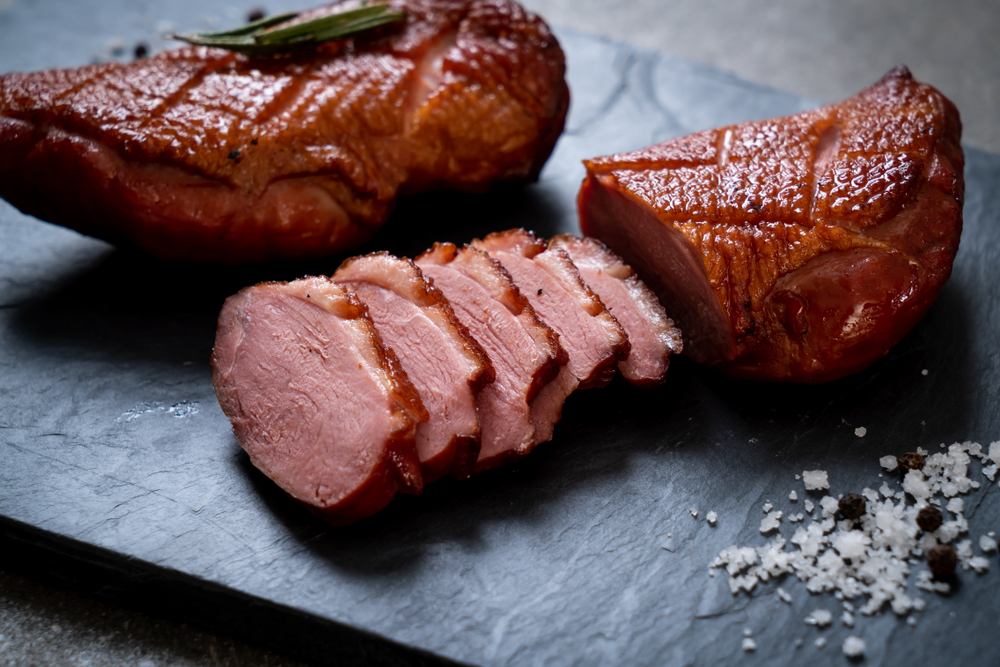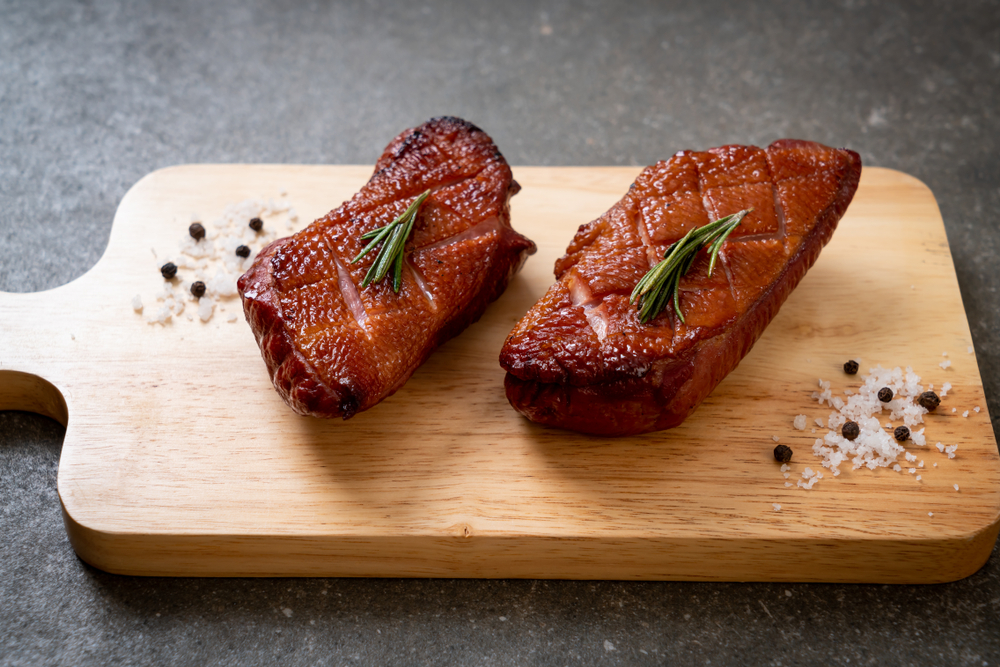This content has been archived. It may no longer be relevant

If you’ve been longing to savor the succulent flavors of perfectly grilled duck with its crackling brown skin, you’re in for a treat.
Grilled duck is a gourmet delight that’s often reserved for special occasions due to its time-consuming and messy preparation process.
However, with the right techniques and tips, you can achieve mouthwatering results that will leave your taste buds craving for more.
In this article, we’ll explore the steps, tricks, and tools needed to grill duck to perfection, whether you’re a seasoned grilling pro or a novice.
So, let’s fire up the grill, head outdoors, and embark on a culinary journey to master the art of grilling duck!
Grilling Vs Smoking Duck
Grilling and smoking are two different methods of cooking duck that can yield distinct flavors and textures.
Grilling involves direct heat from a grill, usually at a higher temperature, while smoking uses indirect heat from smoke generated by wood chips or chunks, resulting in a lower and slower cooking process.
Here are some key differences between grilling and smoking duck.
Grilling Duck
- Quick cooking method. Grilling duck is typically faster compared to smoking, as it involves higher heat and direct cooking over a hot flame.
- Charred, crispy skin. Grilling can create a crispy skin on the duck, with distinct grill marks and a slightly smoky flavor.
- Retains natural flavor. Grilling allows the natural flavors of the duck to shine through, with minimal smoke infusion.
- Juicy and tender. Grilling can result in juicy and tender duck meat, with a slightly pink center when cooked to medium-rare or medium doneness.
Smoking Duck
- Slow cooking method. Smoking duck takes longer, as it involves lower heat and indirect cooking over smoldering wood chips or chunks, resulting in a slower cooking process.
- Smoky flavor. Smoking imparts a rich and smoky flavor to the duck, as the meat absorbs the aromatic smoke from the wood chips or chunks.
- Moisture retention. Smoking can help retain moisture in the duck, resulting in a more succulent and moist texture.
- Unique smoky aroma. Smoking can infuse the duck with a unique smoky aroma that can enhance the overall flavor profile of the meat.
- Tender and falling-off-the-bone. Smoking can result in tender and falling-off-the-bone duck meat, as the slow cooking process breaks down the connective tissues in the meat.
Ultimately, the choice between grilling and smoking duck depends on personal preference and desired flavor profile.
Grilling is quicker and yields a crispy skin with minimal smoke infusion, while smoking takes longer and imparts a rich smoky flavor to the meat.
Both methods can result in deliciously cooked duck, and experimentation with different techniques can help you discover your preferred method for cooking duck to perfection.
How to Grill Duck

Grilling duck can be a delicious and flavorful way to prepare this unique poultry meat.
Here’s a step-by-step guide on how to grill duck.
Ingredients
- Duck breast or whole duck
- Salt and pepper (or other desired seasonings)
- Optional marinade or glaze (e.g., honey, soy sauce, citrus juice)
Instructions
- Prepare the grill. Preheat your grill to medium-high heat, around 350-400°F (175-200°C). If using charcoal, light the charcoal and let it burn until covered with white ash. If using gas, preheat the burners on medium-high heat.
- Prepare the duck. If using duck breast, score the skin with a sharp knife in a crisscross pattern, being careful not to cut through the meat. This will help render the fat and create a crispy skin. If using a whole duck, clean and pat dry with paper towels.
- Season the duck. Season the duck with salt and pepper (or other desired seasonings) on both sides. You can also marinate the duck in a flavorful liquid such as a marinade or glaze for a few hours or overnight in the refrigerator to add extra flavor.
- Grill the duck. Place the duck on the preheated grill, skin-side down if using duck breast. Close the lid and cook for about 6-8 minutes per side, depending on the thickness of the meat, until the internal temperature reaches 145-155°F (63-68°C) for medium-rare to medium doneness. If using a whole duck, start with indirect grilling by placing the duck on the cooler side of the grill and cook with the lid closed for about 30 minutes, then move to direct heat to crisp up the skin for the last 10-15 minutes.
- Rest and slice. Remove the duck from the grill and let it rest for a few minutes before slicing. This allows the juices to redistribute and ensures a juicier result. Slice the duck against the grain for optimal tenderness.
- Optional glaze. If desired, you can brush the duck with a glaze or sauce during the last few minutes of grilling for added flavor. Be careful not to let the glaze burn or char.
- Serve and enjoy. Serve the grilled duck with your favorite sides, such as roasted vegetables, rice, or a fruit sauce. Enjoy the deliciously juicy and flavorful grilled duck!
Note. Cooking times may vary depending on the thickness of the duck and the type of grill used, so it’s always best to check the internal temperature with a meat thermometer for safe and accurate results.
